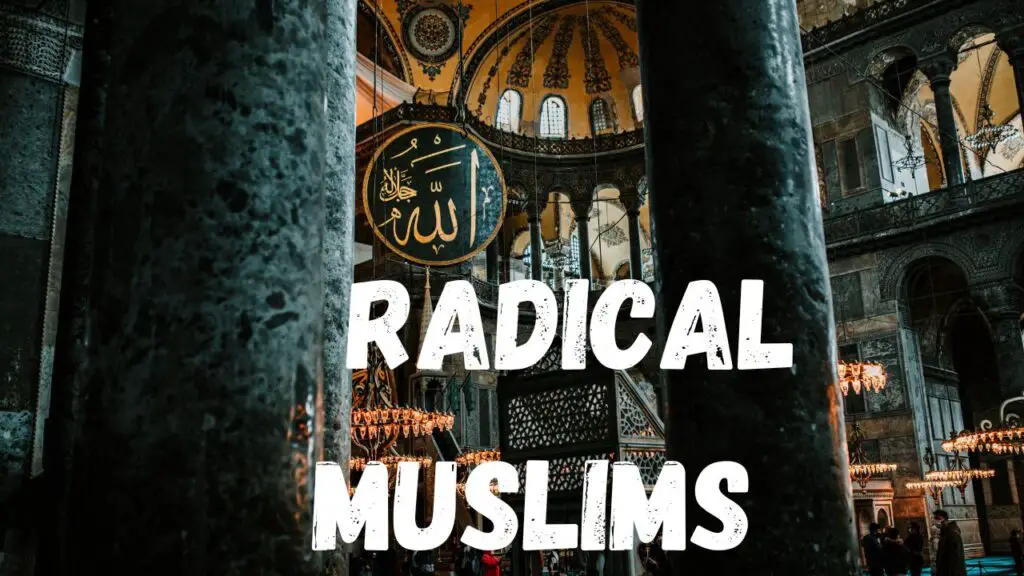What is Radical Muslims in Islam | Reality of Radical Muslims | 2023
"Examining the Complexity of Radicalization Within Muslim Communities"

What is Radical Muslims in Islam?
The ‘radical Muslims’ refers to individuals or groups within the Muslim community who hold extreme or militant beliefs and may be willing to use violence or engage in acts of terrorism to further their goals.

More Article
Introduction of Radical Muslims
The term “radical Muslims” has become a topic of significant concern and debate in recent years. While it is essential to address the issue of radicalization within the Muslim community, it is equally important to recognize that the vast majority of Muslims around the world are peaceful individuals who do not condone violence or extremism. This article aims to shed light on the complex phenomenon of radicalization within the Muslim community, exploring its root causes, manifestations, and potential solutions.
Defining Radicalization
Radicalization refers to the process by which individuals or groups adopt extreme beliefs and ideologies, often leading to acts of violence or terrorism. It is crucial to differentiate between radicalization and Islam as a religion. Radicalization is not exclusive to Islam and can occur within any religious or ideological group.
Root Causes of Radicalization
- Socioeconomic Factors: Socioeconomic disparities and limited access to education and employment opportunities can contribute to a sense of hopelessness and frustration, pushing some individuals towards radicalization as a means of addressing perceived injustices.
- Political Context: Political instability, conflict, and authoritarian regimes in various Muslim-majority countries can create an environment ripe for radicalization. These factors can make individuals susceptible to extremist ideologies that promise change and empowerment.
- Alienation and Identity Crisis: Some individuals may experience feelings of alienation and identity crisis, especially when living in societies where they are marginalized or discriminated against. Radical groups often exploit these vulnerabilities by offering a sense of belonging and purpose.
- Religious Interpretation: Radicalization can also stem from a distorted or extremist interpretation of religious texts. Some individuals may be influenced by charismatic leaders who manipulate religious teachings to justify violence.
Manifestations of Radicalization
- Violent Extremism: The most extreme manifestation of radicalization is participation in acts of violence or terrorism. Radicalized individuals may join terrorist organizations, carry out attacks, or become online propagandists.
- Hate Speech and Incitement: Radicalized individuals often engage in hate speech and incitement, promoting intolerance and violence against specific groups or communities.
- Recruitment: Radical groups actively recruit new members, often targeting vulnerable individuals susceptible to their ideologies. Recruitment can occur online or through personal contact.
- Support for Radical Causes: Some radicalized individuals may provide financial or logistical support to extremist organizations without directly participating in violent activities.
- Self-radicalization: With the rise of the internet, self-radicalization has become more prevalent. Individuals can access extremist materials online and radicalize themselves without direct contact with a physical radical group.
What is ‘radical Muslims’ mean?
The ‘radical Muslims’ refers to individuals or groups within the Muslim community who hold extreme or militant beliefs and may be willing to use violence or engage in acts of terrorism to further their goals.
Is radicalization a widespread issue within the Muslim community?
No, radicalization is not widespread within the Muslim community. The majority of Muslims around the world are peaceful and do not condone violence or extremism.
What are the root causes of radicalization among Muslims?
Radicalization can be influenced by various factors, including socioeconomic disparities, political instability, feelings of alienation, distorted religious interpretations, and exposure to extremist propaganda.
How do radicalized individuals manifest their beliefs?
Radicalized individuals can manifest their beliefs through violent extremism, hate speech, incitement, recruitment efforts, support for extremist causes, and self-radicalization, often online.
What can be done to counter radicalization within Muslim communities?
Strategies to counter radicalization include education and awareness programs, community engagement, interfaith dialogue, rehabilitation and reintegration initiatives, and the promotion of counter-narratives that challenge extremist ideologies.
Countering Radicalization
- Education and Awareness: Promoting education, critical thinking, and media literacy can help individuals recognize and resist extremist propaganda and ideologies.
- Community Engagement: Building strong, inclusive communities that provide support and a sense of belonging can help counter feelings of alienation that make individuals vulnerable to radicalization.
- Interfaith Dialogue: Encouraging dialogue and cooperation among different religious groups can foster understanding and reduce religious tensions that can fuel radicalization.
- Rehabilitation and Reintegration: Programs designed to rehabilitate and reintegrate individuals who have been radicalized can play a crucial role in preventing further acts of violence.
- Counter-Narratives: Governments, civil society organizations, and religious leaders can develop and promote counter-narratives that challenge extremist ideologies and promote peace and tolerance.
Conclusion
Radicalization within the Muslim community is a complex issue that cannot be reduced to a simple stereotype. It is essential to recognize the diverse factors that contribute to radicalization and the fact that the vast majority of Muslims reject violence and extremism. By addressing the root causes, promoting education, fostering inclusive communities, and countering extremist narratives, we can work towards preventing radicalization and building a more peaceful and harmonious world for all. It is crucial to approach this issue with nuance, empathy, and a commitment to promoting tolerance and understanding among all communities.
Faqs About Radical Muslims
Is there a connection between Islam as a religion and radicalization?
Radicalization is a result of distorted interpretations of Islam. It is crucial to distinguish between Islam as a religion and the extremist ideologies of a minority of individuals.
Do all Muslims support or sympathize with radicalized individuals or groups?
No, the overwhelming majority of Muslims condemn radicalization and extremist violence. Many Muslim communities actively work to prevent radicalization and promote peaceful coexistence.
Is radicalization unique to the Muslim community?
No, radicalization can occur within any religious or ideological group. It is not unique to the Muslim community and has been observed in various contexts worldwide.
How can society address radicalization without stigmatizing Muslims?
Addressing radicalization requires a balanced approach that does not stigmatize the entire Muslim community. It involves promoting understanding, inclusivity, and cooperation among all communities.
Are there success stories in countering radicalization within Muslim communities?
Yes, there have been successful efforts to counter radicalization, including community-led initiatives, government programs, and partnerships with religious leaders that have helped individuals disengage from extremist ideologies.





